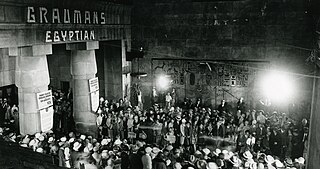
Grauman's Egyptian Theatre, also known as Egyptian Hollywood and The Egyptian, is a historic movie theater located on Hollywood Boulevard in Hollywood, Los Angeles, California. Opened in 1922, it is an early example of a lavish movie palace and is noted as having been the site of the world's first film premiere.
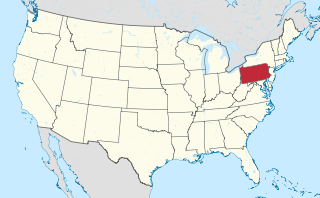
The Philadelphia Main Line, known simply as the Main Line, is an informally delineated historical and social region of suburban Philadelphia, Pennsylvania. Lying along the former Pennsylvania Railroad's once prestigious Main Line, it runs northwest from Center City Philadelphia parallel to Philadelphia and Lancaster Turnpike, also known as U.S. Route 30.

Bala Cynwyd is a community and census-designated place in Lower Merion Township, Pennsylvania, United States. It is located on the Philadelphia Main Line in Southeastern Pennsylvania and borders the western edge of Philadelphia at U.S. Route 1. The present-day community was originally two separate towns, Bala and Cynwyd, but was united as a singular community largely because the U.S. Post Office, the Bala Cynwyd branch, served both towns using ZIP Code 19004. The combining of the communities gives a total population of 9,285 as of the 2020 census. The community was long known as hyphenated Bala-Cynwyd. Bala and Cynwyd are currently served by separate stations on SEPTA's Cynwyd Line of Regional Rail.
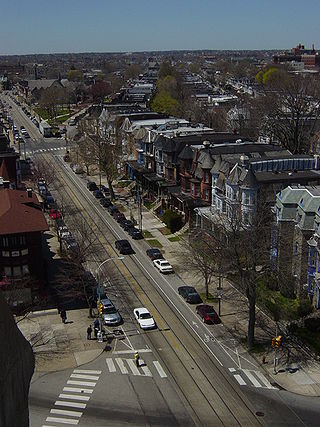
West Philadelphia, nicknamed West Philly, is a section of the city of Philadelphia. Although there are no officially defined boundaries, it is generally considered to reach from the western shore of the Schuylkill River, to City Avenue to the northwest, Cobbs Creek to the southwest, and the SEPTA Media/Wawa Line to the south. An alternate definition includes all city land west of the Schuylkill; this would also include Southwest Philadelphia and its neighborhoods. The eastern side of West Philadelphia is also known as University City.
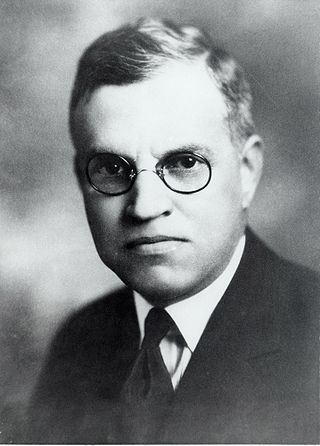
Robert Chambers Reamer (1873–1938) was an American architect, most noted for the Old Faithful Inn in Yellowstone National Park. A number of his works are listed on the National Register of Historic Places for their architecture.
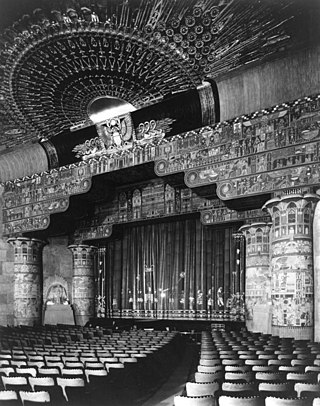
Egyptian-style theatres are based on the traditional and historic design elements of Ancient Egypt.
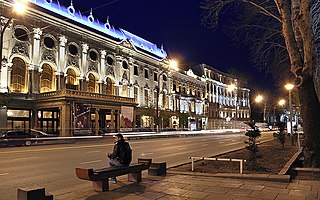
Rustaveli Avenue, formerly known as Golovin Street, is the central avenue in Tbilisi named after the medieval Georgian poet, Shota Rustaveli.

The Florida Theatre is a historic American movie theater located in Jacksonville, Florida. Opened in April 1927, it was added to the U.S. National Register of Historic Places on November 4, 1982. On April 18, 2012, the AIA's Florida Chapter placed the building on its list of Florida Architecture: 100 Years. 100 Places.
The Cultural District is a fourteen-square-block area in Downtown Pittsburgh bordered by the Allegheny River on the north, Tenth Street on the east, Stanwix Street on the west, and Liberty Avenue on the south.

The Detroit Masonic Temple is the world's largest Masonic Temple. Located in the Cass Corridor of Detroit, Michigan, at 500 Temple Street, the building serves as a home to various masonic organizations including the York Rite Sovereign College of North America. The building contains a variety of public spaces including three theaters, three ballrooms and banquet halls, and a 160 by 100 feet clear-span drill hall.

The Egyptian Theatre is a theatre and concert venue in the western United States, located in Boise, Idaho. It has also been known as the Ada Theater. Inaugurated after its erection 97 years ago in 1927, it is the oldest theatre in the city. When it opened, the local press wrote that it "embodies the characteristic features of the land of the Nile, from the truncated pyramids which form the great pylons, to the lotus bud pillars with their ornate frescoes." The great lotus pillars flanking the screen are based on those of Karnak. The theatre has been renovated by Conrad Schmitt Studios.

Theophilus Parsons Chandler Jr. was an American architect of the late 19th and early 20th centuries. He spent his career at Philadelphia, and is best remembered for his churches and country houses. He founded the Department of Architecture at the University of Pennsylvania (1890), and served as its first head.

The Connor Palace, also known as the Palace Theatre and historically as the RKO Palace, is a theater located at 1615 Euclid Avenue in Downtown Cleveland, Ohio, part of Playhouse Square. The theater opened in 1922, as Keith's Palace Theatre after B. F. Keith, founder of the Keith-Albee chain of vaudeville and movie theaters. It was designed by the Chicago architectural firm of Rapp and Rapp in the French Renaissance style, and originally housed live two-a-day vaudeville shows. The $2 million theater opened in the Keith Building on November 6, 1922, seating 3,100. The interior featured Carrara marble and 154 crystal chandeliers, and the main lobby, dubbed the "Great Hall," was decorated with over 30 paintings.

The Madam C. J. Walker Building, which houses the Madam Walker Legacy Center, was built in 1927 in the city of Indianapolis, in the U.S. state of Indiana, and as Madam C. J. Walker Manufacturing Company, it was designated a National Historic Landmark in 1991. The four-story, multi-purpose Walker Building was named in honor of Madam C. J. Walker, the African American hair care and beauty products entrepreneur who founded the Madam C. J. Walker Manufacturing Company, and designed by the Indianapolis architectural firm of Rubush & Hunter. The building served as the world headquarters for Walker's company, as well as entertainment, business, and commercial hub along Indiana Avenue for the city's African American community from the 1920s to the 1950s. The historic gathering place and venue for community events and arts and cultural programs were saved from demolition in the 1970s. The restored building, which includes African, Egyptian, and Moorish designs, is one of the few remaining African-Art Deco buildings in the United States. The Walker Building was added to the National Register of Historic Places in 1980.

The Aztec Theatre is a historic theater in downtown San Antonio, Texas, United States.

State Palace Theatre is a performing arts venue located in downtown New Orleans, Louisiana. It is located at the uptown lake corner of Canal Street and Rampart Street. The Saenger Theater is directly opposite the State Palace on Canal Street.
Hoffman-Hennon was a prominent Philadelphia architectural firm known for its theater designs. W. H. Hoffman was the firm's senior partner. He partnered with Paul J. Henon Jr. to form Hoffman-Henon Co. The firm designed more than 100 theaters, 46 of them in Philadelphia. Many are still standing and several remain open.
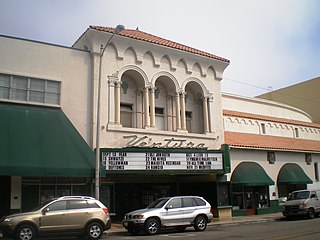
The Ventura Theatre is a historic live concert venue in downtown Ventura, California. This was "the only luxury theatre built in Ventura County in the 1920s in the "style of the great movie palaces." The lavish, elegant interior of gilt and opulence was originally designed by Robert E. Power Studios of San Francisco and has been restored. The theatre with a capacity of 1,150 and a flanking office building were designed by architect L. A. Smith in the Spanish Colonial Revival architecture that was favored by architects of motion picture theaters during the 1920s.

The French International School of Philadelphia is a French international school in Bala Cynwyd, Lower Merion Township, Pennsylvania within the Delaware Valley. As of 1993 it is the only full French bilingual educational program in Pennsylvania. It serves grades PreK-8.
Madison Theater is a historic 1927 theater building in East Atlanta, Georgia. It was designed by Daniell & Beutell in a Moorish Revival architecture style and opened with 600 seats. It is at 496 Flat Shoals Avenue. It closed in the 1970s after a period of being used as an art house cinema. The front of the theater has been converted into several storefronts and the theater space is being used for storage. Features of the theater once included gargoyles, an organ, and fine furnishings. It was listed as endangered in 2018 by the Georgia Trust for Historic Preservation.

















